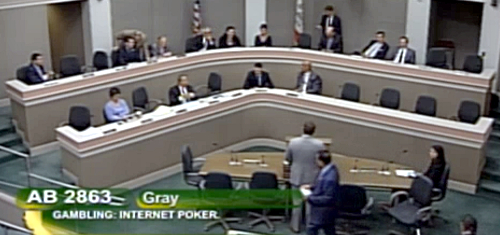 California’s online poker bill is headed for a vote on the state Assembly floor after a favorable vote by the Assembly Appropriations committee.
California’s online poker bill is headed for a vote on the state Assembly floor after a favorable vote by the Assembly Appropriations committee.
On Wednesday, the Appropriations committee officially approved Assemblyman Adam Gray’s AB 2863 legislation, setting up what will be the first online poker floor vote by the full Assembly, two-thirds of which need to approve the bill for it to progress to the state Senate.
The bill received only one ‘no’ vote from the committee, although several members abstained from voting, and many members who’d announced that they would be voting ‘aye’ suggested they could vote ‘nay’ on the Assembly floor if their remaining concerns weren’t addressed.
The bill received a number of amendments before last week’s Assembly committee hearing – mostly concerned with the lingering ‘bad actor’ and ‘tainted assets’ issues surrounding Amaya Gaming’s PokerStars brand – and much of Wednesday’s debate revolved around these issues.
The bill’s tribal opponents were represented by the Yocha Dehe Wintun Nation’s Leland Kinter and the Agua Caliente tribe’s Jeff Grubbe. Kinter said the amendments failed to address the bad actors’ “fruits of corruption” aka online brands, customer lists and marketing data derived from serving the market prior to online poker legalization.
Assemblyman Donald Wagner suggested a flat prohibition on tainted assets would be preferable to Gray’s original plan to block their use for three years following passage of AB 2863. Wagner said the asset question was less of a suitability issue than a competitive one. Assemblyman Bill Quirk said the PokerStars brand itself was the biggest tainted asset of them all.
Gray responded by saying he “suspect we could” impose a permanent ban on tainted assets but noted that his amended bill allows state gaming regulators to impose appropriate restrictions when issuing online poker licenses if they determine that certain assets offer an operator inappropriate advantages.
Gray also questioned the value of data lists, claiming they’d likely been sold “three or four times” since 2011 and suggested companies could derive more worthwhile data from Facebook.
One of Gray’s amendments would impose a five-year licensing ban on operators who served the US market between 2006 and 2011, although this ban could be eliminated via the payment of a $20m fine. (Operators who served the US market post-2011 would face an irrevocable ban.)
Assemblyman Eduardo Garcia suggested that this $20m payment was too low. Garcia also suggested the fine be (a) applicable even if a company opts to sit out the five-year penalty, and (b) imposed following the issuing of the state’s first license, rather than after the bill is passed by legislators.
Garcia wondered if the state’s non-gaming tribes deserved a subsidy like the annual $60m promised to the state’s horseracing stakeholders. Chairperson Lorena Gonzalez said she wanted to see language that prevented racing stakeholders from continuing to receive a cut of this subsidy if they exit the racing business following the bill’s passage.
Gray ended his appearance by saying “every single concern raised” by his fellow legislators was already addressed in AB 2863 but that he would continue to work with his colleagues and poker stakeholders to strengthen the language prior to the floor vote.
It’s unclear when the Assembly might get around to voting on AB 2863, as legislators aren’t in session for most of July.